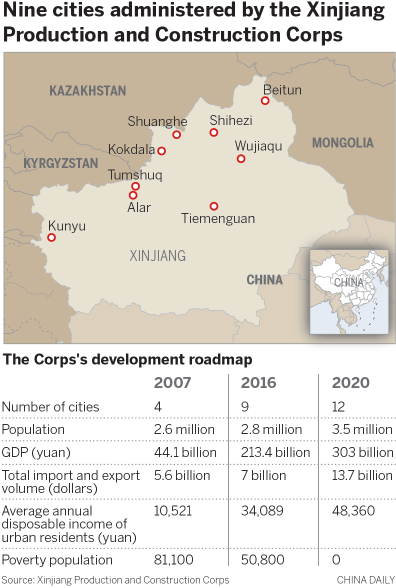Corps has role to play in promoting stability in Xinjiang
By MAO WEIHUA in Urumqi and CUI JIA in Beijing | China Daily | Updated: 2017-04-01 09:09
The Xinjiang Production and Construction Corps, an unique and specialized paramilitary organization in the Xinjiang Uygur autonomous region, will play a better role in ensuring local stability and fighting terrorism, a senior Corps official said on Thursday.
"Maintaining social stability and reinforcing Xinjiang's border control has always been our fundamental role. Such a role must be further enhanced in the future," Sun Jinlong, Party secretary of the Corps, said at the opening of the 7th Party Congress of the Corps held in the regional capital of Urumqi.
The congress will outline the future development of the Corps, which handles its own economic development and administrative affairs under armylike divisions and regiments. The previous Party congress was in 2008.
Sun said the Corps will become a strategic force in routine tasks to keep Xinjiang stable and provide technical support in emergency incidents.
In October 1954, the central government decided to demobilize the troops in Xinjiang and set up the Corps, commonly known as Bingtuan in Chinese, to open agricultural and stock farms in the harsh environments of the Gobi Desert, and station them at the region's border areas as a militia force to stabilize Xinjiang.
The Corps was given a ministerial-level administrative status, equal to that of Xinjiang's regional government, in 1998. The Corps now administers nine cities and 10 townships in Xinjiang, with a population of 2.8 million. Some of its members are required to receive systematic and routine training as militias besides their day jobs.
On Friday, Sun also said that the Corps will step up its development in the less developed southern Xinjiang region and create more job opportunities there.
Social stability in southern Xinjiang is believed to be the key to regional security. The region has been the country's main battleground in the fight against terrorism and the penetration of extremism from abroad.
President Xi Jinping paid a visit to the Corps in 2014, and said he expected the Corps to play an important and irreplaceable strategic role in the fight against separatism, extremism and terrorism in Xinjiang. Xi also said that more efforts and reform are needed to build the Corps into a stabilizing force for the country's border areas and a melting pot where various ethnic groups are integrated.
In addition, the Corps will further improve the quality of its economic development via new-type industrialization and urbanization as well as agricultural modernization, Sun said.

























